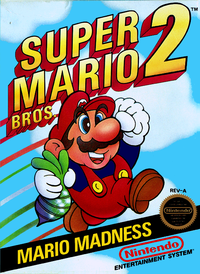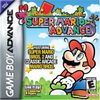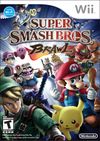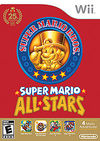| Site Notice |
|---|
|
We have a limited coverage policy. Please check our coverage page to see which articles are allowed. |
Difference between revisions of "Super Mario Bros. 2"
(→External links) |
m (→Technical details) |
||
| (14 intermediate revisions by 5 users not shown) | |||
| Line 3: | Line 3: | ||
|title=Super Mario Bros. 2 | |title=Super Mario Bros. 2 | ||
|jptitle=スーパーマリオUSA | |jptitle=スーパーマリオUSA | ||
| + | |jptranslation=Sūpā Mario USA | ||
|jptrans=Super Mario USA | |jptrans=Super Mario USA | ||
| − | |boxart=SMB2 Boxart. | + | |boxart=SMB2 Boxart.png |
|developer=[[Nintendo Entertainment Analysis and Development|Nintendo EAD]] | |developer=[[Nintendo Entertainment Analysis and Development|Nintendo EAD]] | ||
|publisher=[[Nintendo]] | |publisher=[[Nintendo]] | ||
| Line 11: | Line 12: | ||
|players=1 | |players=1 | ||
|predecessor=''[[Super Mario Bros.]]'' | |predecessor=''[[Super Mario Bros.]]'' | ||
| − | |successor=''[[Super Mario Bros. 3]]'' | + | |successor=''[[Super Mario Bros. 3]]'' (see also ''[[BS Super Mario USA: Power Challenge]]'') |
|wii_points=500 | |wii_points=500 | ||
|ndsi_points= | |ndsi_points= | ||
| Line 20: | Line 21: | ||
|releasekr=July 15, 2008 (VC) | |releasekr=July 15, 2008 (VC) | ||
|esrb=E | |esrb=E | ||
| − | |acb= | + | |acb=G |
| − | |pegi= | + | |pegi=3 |
| − | |cero= | + | |cero=A |
| − | | | + | |grac= |
| − | | | + | |usk= |
| − | |||
|niwa=Super Mario Wiki | |niwa=Super Mario Wiki | ||
|colorscheme=Mario | |colorscheme=Mario | ||
}} | }} | ||
| + | ''This article is about the overseas game with this title. See [[Super Mario Bros.: The Lost Levels]] for the game known as Super Mario Bros. 2 in Japan.'' | ||
| − | '''''Super Mario Bros. 2''''' | + | '''''Super Mario Bros. 2''''' is a platformer video game released for the [[Nintendo Entertainment System]] in 1988 as the sequel to the original ''[[Super Mario Bros.]]''. Because of the difficulty of the ''[[Super Mario Bros.: The Lost Levels|Super Mario Bros. 2]]'' released in Japan and its graphical similarities to the original game, Nintendo instead altered the {{FDS}} game ''[[Yume Kōjō: Doki Doki Panic]]'' and released it overseas as ''Super Mario Bros. 2''. This game would later be released in Japan in 1992 as ''Super Mario USA''. |
==Blurb== | ==Blurb== | ||
| Line 41: | Line 42: | ||
Due to ''Super Mario Bros. 2'' being a redesign of ''[[Yume Kōjō: Doki Doki Panic]]'', it has many elements not present in the original ''[[Super Mario Bros.]]'', such as the ability to pick up and throw enemies and objects and a life meter. However, it does have some power-ups similiar to the ones in the first game such as the mushrooms and the Starman. | Due to ''Super Mario Bros. 2'' being a redesign of ''[[Yume Kōjō: Doki Doki Panic]]'', it has many elements not present in the original ''[[Super Mario Bros.]]'', such as the ability to pick up and throw enemies and objects and a life meter. However, it does have some power-ups similiar to the ones in the first game such as the mushrooms and the Starman. | ||
| − | At the start of each level, the player | + | At the start of each level, the player chooses which character they want to play as. The playable characters are Mario, Luigi, Toad, and Princess Toadstool. They each have slightly different jumping power, with Luigi being able to jump the highest and Toad having the least jumping power. They also having varying speeds in picking up items, with Toad being the quickest and Princess Toadstool being the slowest. Unlike in the original, the player chooses their character at the start of every level, and can beat the game without needing to play as all four characters. |
There are seven worlds in ''Super Mario Bros. 2''. The first six worlds each have three levels while the seventh world has two. At the end of most levels, the player has to fight Birdo and another boss at the end of each world. | There are seven worlds in ''Super Mario Bros. 2''. The first six worlds each have three levels while the seventh world has two. At the end of most levels, the player has to fight Birdo and another boss at the end of each world. | ||
| + | |||
| + | ==Technical details== | ||
| + | {{Game Technical Details | ||
| + | |media=NES [[Game Pak]]<br>Game Boy Advance Game Pak<br>Digital download (Wii, Nintendo 3DS, Wii U) | ||
| + | |gamesize=Nintendo 3DS: 67 blocks | ||
| + | |input=NES: [[Nintendo Entertainment System Controller]]<br>Game Boy Advance<br>Wii: [[Wii Remote]], [[Classic Controller]], [[Nintendo GameCube Controller]]<br>Nintendo 3DS<br>Wii U: [[Wii U GamePad]], [[Wii U Pro Controller]], Wii Remote, Classic Controller | ||
| + | }} | ||
==Other releases== | ==Other releases== | ||
| − | ''Super Mario Bros. 2'' | + | {{ReleaseList/header|colorscheme=Mario}} |
| − | + | {{ReleaseList/cell | |
| − | + | |''Super Mario Bros. 2'' | |
| − | + | | | |
| − | '' | + | |Arcade ([[Nintendo PlayChoice-10]]) |
| − | + | |1988 | |
| − | + | |A direct port of ''Super Mario Bros. 2'' released for arcades.}} | |
| − | | | + | {{ReleaseList/cell |
| − | + | |''Super Mario USA'' | |
| − | + | | | |
| − | + | |[[Family Computer|Famicom]] | |
| − | + | |1992 | |
| − | + | |A direct port of the game for the Famicom, titled ''Super Mario USA''.}} | |
| − | + | {{ReleaseList/cell | |
| − | | | + | |''[[Super Mario All-Stars]]'' (+ ''[[Super Mario World]]'') |
| − | + | |[[File:SMAS.jpg|100px|center|frameless]] | |
| − | | {{ | + | |[[Super Nintendo Entertainment System|SNES]] |
| − | | | + | |'''Original''': 1993<br> |
| − | | | + | '''+ SMW''':<br> |
| − | | [[ | + | 1994 (NA)<br>1995 (EU) |
| − | | | + | |A compilation of remakes of the first four ''Super Mario Bros.'' games (''Super Mario All-Stars + Super Mario World'' featuring ''Super Mario World'' in addition), featuring updated graphics, sound, and programming.}} |
| − | |- | + | {{ReleaseList/cell |
| − | + | |''[[Super Mario Advance]]'' | |
| + | |[[File:Super Mario Advance SMB2 GBA box.jpg|100px|center|frameless]] | ||
| + | |[[Game Boy Advance]] | ||
| + | |2001 | ||
| + | |A Game Boy Advance port of ''Super Mario Bros. 2'', including ''[[Mario Bros.]]'' as an additional feature.}} | ||
| + | {{ReleaseList/cell | ||
| + | |''Super Mario Bros. 2'' | ||
| + | | | ||
| + | |[[Wii]] ([[Virtual Console]]) | ||
| + | |2007 (NA/JPN/EU/AUS)<br>2008 (KOR) | ||
| + | |A direct port of the game, released as a digital download for [[Wii]].}} | ||
| + | {{ReleaseList/cell | ||
| + | |''[[Super Smash Bros. Brawl]]'' | ||
| + | |[[File:Super Smash Bros Brawl Boxart.jpg|100px|center|frameless]] | ||
| + | |Wii | ||
| + | |2008 | ||
| + | |A direct port of the game is included as a Masterpiece, as a 90-second timed demo.}} | ||
| + | {{ReleaseList/cell | ||
| + | |''[[Super Mario All-Stars Limited Edition]]'' | ||
| + | |[[File:SMASLE.jpg|100px|center|frameless]] | ||
| + | |Wii | ||
| + | |2010 | ||
| + | |A direct port of ''Super Mario All-Stars'' for the SNES.}} | ||
| + | {{ReleaseList/cell | ||
| + | |''Super Mario Bros. 2'' | ||
| + | | | ||
| + | |[[Nintendo 3DS]] (Virtual Console) | ||
| + | |2012 (JPN)<br>2013 (NA/EU/AUS)<br>2016 (KOR) | ||
| + | |A direct port of the original game with added Virtual Console emulator features.}} | ||
| + | {{ReleaseList/cell | ||
| + | |''Super Mario Bros. 2'' | ||
| + | | | ||
| + | |[[Wii U]] (Virtual Console) | ||
| + | |2013 (NA/EU/AUS)<br>2014 (JPN) | ||
| + | |A direct port of the original game with added Virtual Console emulator features.}} | ||
| + | {{ReleaseList/cell | ||
| + | |''Super Mario Bros. 2'' | ||
| + | |[[File:NES Classic Edition NA box.png|100px|center]] | ||
| + | |[[Nintendo Entertainment System: NES Classic Edition]] | ||
| + | |2016 | ||
| + | |''Super Mario Bros.'' is one of the games pre-loaded onto the system.}} | ||
| + | {{ReleaseList/footer}} | ||
==References== | ==References== | ||
| Line 74: | Line 123: | ||
<references/> | <references/> | ||
</div> | </div> | ||
| − | |||
==External links== | ==External links== | ||
| − | * {{wp|Super Mario Bros. 2|Wikipedia | + | *{{wp|Super Mario Bros. 2|''Super Mario Bros. 2'' on Wikipedia}} |
| − | + | *{{sw|Super Mario Bros. 2|''Super Mario Bros. 2'' guide on StrategyWiki}} | |
| − | * {{sw|Super Mario Bros. 2|StrategyWiki | + | {{-}} |
| − | |||
| − | |||
{{Super Mario series}} | {{Super Mario series}} | ||
{{Classic NES series}} | {{Classic NES series}} | ||
Latest revision as of 09:38, 25 June 2023
| This article is a short summary of Super Mario Bros. 2. Super Mario Wiki features a more in-depth article. |
| Super Mario Bros. 2 | ||||||||||||||
| スーパーマリオUSA Sūpā Mario USA | ||||||||||||||
| ||||||||||||||
| ||||||||||||||
| ||||||||||||||
| ||||||||||||||
|
This article is about the overseas game with this title. See Super Mario Bros.: The Lost Levels for the game known as Super Mario Bros. 2 in Japan.
Super Mario Bros. 2 is a platformer video game released for the Nintendo Entertainment System in 1988 as the sequel to the original Super Mario Bros.. Because of the difficulty of the Super Mario Bros. 2 released in Japan and its graphical similarities to the original game, Nintendo instead altered the Famicom Disk System game Yume Kōjō: Doki Doki Panic and released it overseas as Super Mario Bros. 2. This game would later be released in Japan in 1992 as Super Mario USA.
Contents
Blurb
"Mario's back! Bigger and badder than ever before! This time it's a fierce action-packed battle to free the land of Subcon from the curse of the evil Wart. It's up to you, along with Mario, Luigi, Toad, and the Princess, to fight your way through bizarre multi-level worlds and find him! This time you've got a brand new kind of power—plucking power—and now anything you find can be a weapon. But beware! You've never seen creatures like these! Shyguys and Tweeters! Ninji and Beezos! And you've never had an adventure like this! Only cunning and speed can save you now..."
Story
One night, Mario has a strange dream where he sees a long stairway leading up to a door. When he opens the door, he sees a completely different world and hears a faint voice telling him that the land was cursed by Wart. As soon as the voice pleads Mario to help, a bolt of lightning suddenly flashes and causes Mario to wake up. He tells Luigi, Toad, and Princess Toadstool about his dream and they decide to go a nearby mountain for a picnic. While looking at the scenery they notice a small cave nearby and enter it. They see a long stairway strikingly similar to the one Mario saw in his dream and climb it. When the open the door at the top of the stairway, they see the same world that Mario had seen, much to their surprise.[1]
Gameplay
Due to Super Mario Bros. 2 being a redesign of Yume Kōjō: Doki Doki Panic, it has many elements not present in the original Super Mario Bros., such as the ability to pick up and throw enemies and objects and a life meter. However, it does have some power-ups similiar to the ones in the first game such as the mushrooms and the Starman.
At the start of each level, the player chooses which character they want to play as. The playable characters are Mario, Luigi, Toad, and Princess Toadstool. They each have slightly different jumping power, with Luigi being able to jump the highest and Toad having the least jumping power. They also having varying speeds in picking up items, with Toad being the quickest and Princess Toadstool being the slowest. Unlike in the original, the player chooses their character at the start of every level, and can beat the game without needing to play as all four characters.
There are seven worlds in Super Mario Bros. 2. The first six worlds each have three levels while the seventh world has two. At the end of most levels, the player has to fight Birdo and another boss at the end of each world.
Technical details
|
Other releases
| Title | Cover art | Platform | Release date(s) | Notes |
|---|---|---|---|---|
| Super Mario Bros. 2 | Arcade (Nintendo PlayChoice-10) | 1988 | A direct port of Super Mario Bros. 2 released for arcades. | |
| Super Mario USA | Famicom | 1992 | A direct port of the game for the Famicom, titled Super Mario USA. | |
| Super Mario All-Stars (+ Super Mario World) | SNES | Original: 1993 + SMW: |
A compilation of remakes of the first four Super Mario Bros. games (Super Mario All-Stars + Super Mario World featuring Super Mario World in addition), featuring updated graphics, sound, and programming. | |
| Super Mario Advance | Game Boy Advance | 2001 | A Game Boy Advance port of Super Mario Bros. 2, including Mario Bros. as an additional feature. | |
| Super Mario Bros. 2 | Wii (Virtual Console) | 2007 (NA/JPN/EU/AUS) 2008 (KOR) |
A direct port of the game, released as a digital download for Wii. | |
| Super Smash Bros. Brawl | Wii | 2008 | A direct port of the game is included as a Masterpiece, as a 90-second timed demo. | |
| Super Mario All-Stars Limited Edition | Wii | 2010 | A direct port of Super Mario All-Stars for the SNES. | |
| Super Mario Bros. 2 | Nintendo 3DS (Virtual Console) | 2012 (JPN) 2013 (NA/EU/AUS) 2016 (KOR) |
A direct port of the original game with added Virtual Console emulator features. | |
| Super Mario Bros. 2 | Wii U (Virtual Console) | 2013 (NA/EU/AUS) 2014 (JPN) |
A direct port of the original game with added Virtual Console emulator features. | |
| Super Mario Bros. 2 | Nintendo Entertainment System: NES Classic Edition | 2016 | Super Mario Bros. is one of the games pre-loaded onto the system. |
References
- ↑ Super Mario Bros. 2 instruction booklet, pages 3-4
External links
|
|
| ||||||
| ||||||







